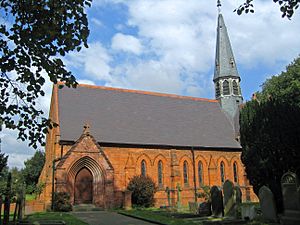St Michael and All Angels Church, Little Leigh facts for kids
Quick facts for kids St Michael and All Angels Church,Little Leigh |
|
|---|---|

St Michael and All Angels Church, Little Leigh,
from the south |
|
| Lua error in Module:Location_map at line 420: attempt to index field 'wikibase' (a nil value). | |
| OS grid reference | SJ 615 759 |
| Location | Little Leigh, Cheshire |
| Country | England |
| Denomination | Anglican |
| Website | Parish of Aston-by-Sutton, Little Leigh & Lower Whitley |
| History | |
| Status | Parish church |
| Dedication | St Michael |
| Architecture | |
| Functional status | Active |
| Heritage designation | Grade II |
| Designated | 18 July 1986 |
| Architect(s) | Edmund Kirby |
| Architectural type | Church |
| Style | Gothic Revival |
| Completed | 1879 |
| Specifications | |
| Materials | Brick with terracotta dressings Welsh slate roof with an orange tile ridge |
| Administration | |
| Parish | Little Leigh |
| Deanery | Great Budworth |
| Archdeaconry | Chester |
| Diocese | Chester |
| Province | York |
St Michael and All Angels Church is a beautiful church located in the village of Little Leigh, Cheshire, England. It's an active church for the Anglican faith, which is a type of Christian church. This church is considered a special historical building, listed as Grade II, meaning it's important to protect. It's one of three churches that work together in the area, along with St Peter's in Aston-by-Sutton and St Luke's in Lower Whitley. Before May 31, 2013, these churches were separate but worked closely together.
Contents
The Church's Story
Long ago, Little Leigh had a small church building called a "chapel of ease." This was a smaller church that helped people attend services without traveling far. In 1712, this old chapel was completely rebuilt. People at the time described it as a "mean building of brick," meaning it was quite simple.
Part of the old chapel was even used as the village school until a new school building was finished in 1840. The spot where this old chapel stood is now part of the churchyard. The church you see today was built in 1879. It was designed by a famous architect named Edmund Kirby.
What the Church Looks Like
Outside the Church
The church is built with bright orange bricks and decorated with terracotta, which is a type of baked clay. The roof is made of dark grey slate tiles from Wales, with a line of orange tiles along the top.
The church has a main long part called a nave, with smaller sections sticking out on the sides called transepts. There's also a chancel at the end, a porch on the south side, and a tall, thin spire where the different parts of the church meet. The building style is Gothic, which means it looks like churches from the Middle Ages.
Along the sides of the nave, there are strong supports called buttresses and flat, triangular-shaped columns. Between these supports, you'll see pairs of tall, narrow windows called lancet windows. The spire is a large, pointed tower called a flèche. It has wooden openings for bells on each side. Above these are small windows called lucarnes, a lead decoration at the very top, and a weathercock that shows wind direction.
Inside the Church
The inside of St Michael and All Angels Church is also made entirely of brick and terracotta. In the chancel, which is the part of the church near the altar, there's a special bench with three seats called a sedilia. Above each seat, there's a lancet window.
The reredos, which is a decorated screen behind the altar, was created by Jabez Thompson. It shows a scene of the Last Supper made from terracotta. You can also see beautiful stained glass windows, including one from the mid-1900s by an artist named Trena Cox. Experts who wrote the Buildings of England books think the large window at the east end of the church is very impressive.
Other Features Around the Church
Near the church, there's a special gate called a lychgate, which was built in 1882. It's also a Grade II listed building. It's made of open wooden beams and has a sloped roof covered with slate tiles from the Lake District. In the churchyard, there are two war graves from World War II, one for a soldier and one for an airman.
See also
- Listed buildings in Little Leigh
- List of works by Edmund Kirby
 | Ernest Everett Just |
 | Mary Jackson |
 | Emmett Chappelle |
 | Marie Maynard Daly |

